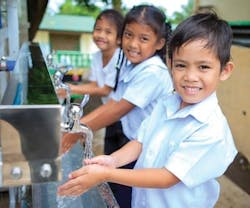Contaminant Removal: 24 Communities, 24 Systems, 24 Hours
About the author: Mark Cain is chief marketing officer for Planet Water Foundation. Cain can be reached at [email protected] or 877.771.3083.
According to a 2014 update from the World Health Organization (WHO) and UNICEF, 748 million people worldwide live without access to clean water every day. In many areas of the world, including in the Asia-Pacific region and Latin America, the percentage of those lacking access to potable water is much greater. Planet Water Foundation strives to alleviate waterborne disease in the world’s most vulnerable communities by providing access to clean, safe drinking water and hygiene education programs.
In 2015, Planet Water launched Project 24 on World Water Day, March 22, as a way to draw attention to the world water crisis. Project 24 erected 24 clean water filtration systems (AquaTowers) in 24 communities in 24 hours, providing clean water to more than 24,000 people. In 2016 the project was expanded to five countries: Cambodia, Colombia, India, Indonesia and the Philippines. The project presents unique challenges, as it normally takes one day to deploy a single AquaTower.
AquaTower filtration systems provide an efficient, affordable, scalable solution for communities in need of clean water. They typically are installed on primary school grounds, enabling the organization to target its programs toward children.
Keep the System Flowing
“One challenge in providing clean water access to impoverished communities can actually come through the drilling of a well, as well water often becomes contaminated,” said Mark Steele, CEO of Planet Water. “Utilizing an existing water source such as a river, lake, canal or well, contaminated water is routed to the AquaTower site and pumped—either with minimal use of electricity or with a manual treadle or bicycle pump—to an elevated water storage tank. The system then operates by gravity alone, drawing water down through the AquaTower’s filtration system.”
The systems utilize ultrafiltration to create a physical barrier against bacteria, protozoa, viruses, pathogens and other contaminants large than 0.1 µ. The resulting drinking water meets WHO water quality standards.
The water is dispensed through nine faucets around the tower, providing up to 1,000 liters per hour, supporting the daily drinking water and handwashing requirements of up to 1,000 people. The overall design is modular, with few moving parts to allow for easy installation and maintenance. The systems are low-cost, easily replicated and scalable. They operate without the use of chemicals and require no consumables.
Power in Education
In addition to providing clean water, Planet Water projects include a four-module water health and hygiene education program to teach children healthy, lifelong behaviors. A recent health impact study by the University of Nebraska College of Public Health showed the combination of clean water systems and hygiene education programs has resulted in higher school attendance and improved academic performance in the communities the organization supports. Children benefitting from these interventions experienced an 80% decrease in diarrheal episodes, with 58% of non-residential students achieving A grades (using math as a proxy) versus 27% for students not participating in the program.
Locating the projects at schools promotes the engagement of school staff to maintain the water filtration system on a daily basis. Planet Water’s in-country team educates the school staff on routine cleaning and maintenance procedures.
“When routine manual cleaning procedures are followed, the AquaTower will operate for at least five to seven years without any consumable components, at which point the only maintenance needed is a replacement of the filter element,” Steele said. “A daily cleaning procedure flushes the system of contaminants, while a more thorough weekly process ensures that the system is sanitized. Additionally, Planet Water’s teams visit each project three times per year for five years to ensure all AquaTower systems are fully operational and to reinforce any training necessary on maintenance procedures.”
Community Longevity
In erecting the AquaTowers, the organization aims to provide local, sustainable jobs. It sources as many components as possible locally to minimize shipping costs and promote self sufficiency.
“A few critical filtration components are sourced from a single manufacturer to ensure consistency and quality, but by establishing local supply chains, we are able to integrate the highest-quality components while supporting community job creation,” Steele said.
In 2017, Planet Water hopes to expand Project 24 to more communities. To date, the organization has deployed nearly 700 AquaTowers in 12 countries, supporting the daily water requirements of 700,000 people.
Download: Here
